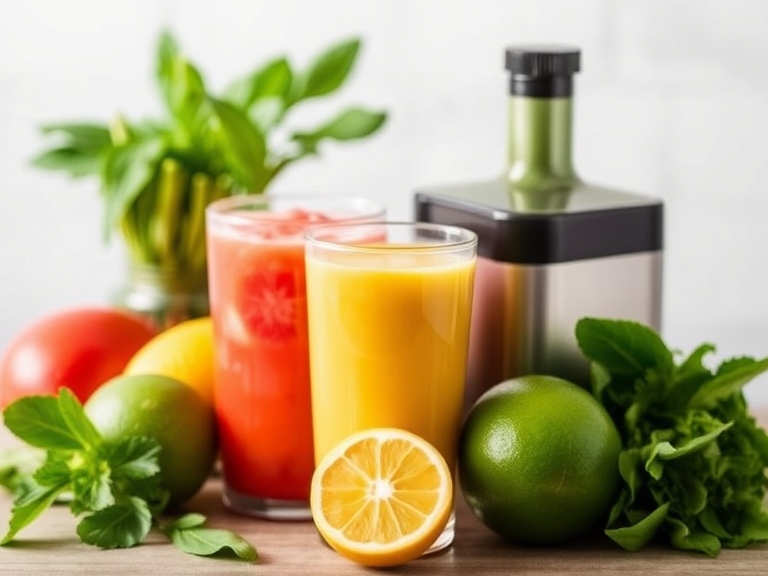Part 1: General Introduction
Fruit Juice and Weight Loss: The Perfect Combination?
Weight loss through fruit juice has emerged as a popular trend in recent years. Advocates praise its ability to provide essential nutrients while promoting fat loss and detoxification. But is it as effective as it seems? This article explores the science behind fruit juice diets and their role in healthy weight loss.
The Growing Trend of Juice-Based Weight Loss
Juice cleanses and detox diets are increasingly being embraced by individuals looking for a quick way to shed pounds. The appeal lies in their simplicity and the perception that they are a “natural” and “clean” method of dieting.
The General Benefits of Drinking Fruit Juice
Drinking fruit juice offers several health benefits:
- Rich in nutrients: Packed with vitamins, minerals, and antioxidants.
- Hydration: Improves overall water intake.
- Convenience: Easy to prepare and consume on the go.
How Juice Supports Weight Loss
Fruit juices aid weight loss through:
- Calorie control: Juices, when consumed in moderation, can replace high-calorie snacks.
- Boosting metabolism: Certain fruits contain enzymes and compounds that accelerate fat burning.
- Promoting detoxification: Helps the body flush out toxins that may hinder weight management.
Role of Fiber, Vitamins, and Minerals
Although juicing often removes fiber, the liquid retains essential vitamins and minerals, such as Vitamin C, potassium, and antioxidants. These nutrients support metabolism, energy levels, and overall health during weight loss.
Effects on Metabolism
Juices derived from metabolism-boosting ingredients (e.g., ginger, lemon, green apple) may enhance fat burning. Research has shown that citrus fruits, for example, can improve lipid metabolism due to their high vitamin C content and bioactive compounds.
Part 2: Benefits of Weight Loss with Fruit Juice
In the pursuit of weight loss, many individuals are constantly searching for effective and sustainable methods. One approach that has gained traction in recent years is incorporating fruit juice into one’s diet. While it’s important to understand that fruit juice should not serve as the sole component of a weight-loss plan, its benefits are noteworthy when used as part of a balanced diet.
Nutrient-Dense Hydration
One of the primary advantages of fruit juice is that it provides a hydrating and nutrient-dense alternative to sugary drinks. For instance, consider a person who regularly consumes soda. A 12-ounce can of cola contains approximately 140 calories, mostly from added sugars, without any nutritional value. In contrast, an 8-ounce serving of 100% orange juice is around 110 calories but packs a significant dose of vitamin C, potassium, and antioxidants.
Example: Sarah, a 28-year-old teacher, decided to replace her daily soda intake with fresh fruit juice. After just two weeks, she reported feeling more energized and noticed her cravings for sugary snacks diminished significantly. This simple swap helped her drop 4 pounds in the first month as she became more mindful of her overall diet.
Satiety and Reduced Cravings
Another benefit of fruit juice, especially when it is freshly made at home, is that it can help curb hunger and reduce cravings. This is primarily due to the fiber found in whole fruits, which, while less prevalent in juice, can still aid in making a person feel full. Juices made from fiber-rich fruits like apples or pears can be particularly satisfying when consumed in moderation.
Example: Mark, a 35-year-old office worker, included a glass of homemade apple-carrot juice in his breakfast routine. Not only did he enjoy the refreshing taste, but he found that it helped control his mid-morning snack cravings. Over the course of two months, his weight gradually decreased by 8 pounds, and he credited his successful mornings to his tart and slightly sweet beverage.
Antioxidants and Metabolism
Fruit juices, particularly those made from berries, citrus fruits, and greens, are rich sources of antioxidants. These compounds help fight inflammation and may contribute to a healthy metabolism. Drinking antioxidants-rich juices can support the body in various ways, potentially making weight loss more achievable.
Example: Emily, a fitness enthusiast, regularly consumed a blend of spinach, kale, and mixed berries in her post-workout shakes. After three months of this daily ritual, combined with a consistent workout regimen, she experienced a noticeable improvement in her energy levels and dropped nearly 10 pounds. Emily noted that the juice made her post-exercise recovery more efficient, enabling her to stay dedicated to her fitness goals.
Portion Control and Caloric Awareness
Incorporating fruit juice into a weight-loss strategy also encourages individuals to become more conscious of their calorie intake. By measuring juice portions, individuals can better manage their overall consumption and make healthier choices. A serving of juice (approximately 4 to 6 ounces) provides essential nutrients without overwhelming the body with excess calories.
Example: James, a 42-year-old entrepreneur, started measuring his juice intake. He replaced sugary coffee creamers with a small amount of fresh juice in his drinks. After a focused commitment to portion control, he saw a shift in his eating habits. Within six weeks, he successfully lost 6 pounds and felt more in control of his dietary choices.
Supporting Weight Loss
- Promotes Satiety
Juices containing fiber-rich ingredients, such as cucumber or carrots, can help curb hunger. For example, pectin in apples slows digestion, making you feel full longer. - Burns Fat
Some ingredients, like grapefruit and green tea extract (often added to juices), stimulate fat metabolism. Studies suggest that consuming grapefruit juice may reduce body fat when paired with a balanced diet. - Detoxifies the Body
Juices high in antioxidants (like beetroot or berries) support liver function and remove toxins.
Enhancing Health
- Provides Essential Nutrients
Juices can supply an abundance of vitamins and minerals essential for overall well-being. - Improves Digestion
Ingredients like pineapple and papaya contain enzymes (bromelain and papain) that aid digestion. - Beautifies Skin
Vitamin A in carrot juice and Vitamin C in orange juice can enhance skin elasticity and reduce signs of aging. - Prevents Diseases
Nutrients in certain juices, like potassium in celery or magnesium in spinach, can lower blood pressure, reducing risks of cardiovascular disease and diabetes.
Part 3: Effective Juice Options for Weight Loss
Green Juices
- Examples: Celery, kale, spinach
- Benefits: High in chlorophyll, vitamin K, and antioxidants; reduces inflammation.
- Recipe: Blend celery, green apple, cucumber, and lemon for a refreshing detox drink.
Fruit-Based Juices
- Examples: Grapefruit, pineapple, apple
- Benefits: Rich in vitamin C, improves immunity, and boosts metabolism.
- Recipe: Mix grapefruit juice with ginger and mint for a tangy fat-burning drink.
Combined Vegetable and Fruit Juices
- Examples: Beetroot, carrot, and apple
- Benefits: Provides a balanced nutrient profile and enhances flavor.
- Recipe: Blend beetroot, carrot, apple, and a dash of lemon for a nutrient-packed juice.
Part 4: Preparation and Usage Tips
Choosing Fresh Ingredients
- Selection Criteria
Use seasonal and organic produce when possible for better taste and higher nutrient content. - Understanding Origins
Locally sourced fruits and vegetables often contain fewer pesticides and are fresher.
Making Juice
- Use a juicer for smoother consistency or a blender for fiber retention.
- Always wash ingredients thoroughly before juicing.
Drinking Juice
- Optimal Timing
Drink juice in the morning or as a mid-day snack for maximum absorption. Avoid consuming juices late at night. - Recommended Portions
Stick to 1-2 cups per serving to avoid excess sugar intake.
Important Considerations
- Juices should complement meals, not replace them entirely.
- Consult a doctor before starting a juice cleanse, especially for individuals with health conditions like diabetes or gastrointestinal disorders.
Part 5: Key Considerations

Not a Standalone Solution
For sustainable weight loss, pair juicing with:
- A balanced diet
- Regular physical activity
Unsuitable for Everyone
Juicing might not be ideal for:
- Individuals with sensitive stomachs or gastrointestinal issues.
- Diabetics due to the high sugar content of certain juices.
Potential Side Effects
- Diarrhea or bloating: Caused by excessive intake of certain fruits.
- Nutritional Imbalance: Sole reliance on juices may lead to protein and fat deficiencies.
Weight loss through fruit juice offers numerous health benefits, from aiding digestion to detoxifying the body. However, it is not a one-size-fits-all solution and should be incorporated into a holistic lifestyle approach.
Final Advice
To achieve lasting results, combine juicing with a nutritious diet, regular exercise, and a well-rounded lifestyle. Always seek advice from a nutritionist to tailor the approach to your individual needs.



